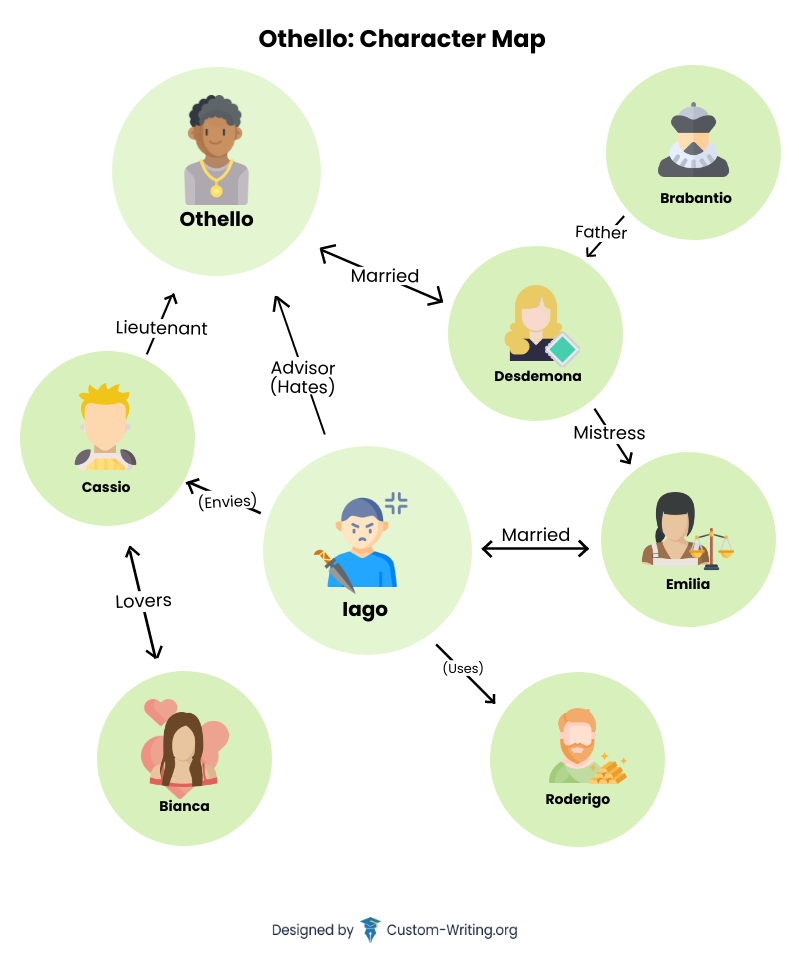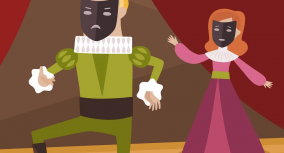Othello is Shakespeare’s five-act play, the full name of which is The Tragedy of Othello, the Moor of Venice. While a detailed Othello character map includes over 20 figures, only 7 of them are central to the plot. Othello character analysis has been a key focus for many Shakespearean scholars, as the play illustrates various aspects of human relationships: jealousy, manipulations, gaslighting, betrayal, and more.
This article, prepared by our custom writing team, contains:
- The Othello character map that briefly outlines the relationships between the key figures.
- An Othello character analysis with quotes focused on Othello, Iago, Desdemona, Emilia, Cassio, Roderigo, and Brabantio.
Each Othello character quote is carefully selected to deepen your understanding of their role and significance in the plot.

Othello
In Othello, the Moor of Venice, Othello (the central character) plays the leading role. He is a noble warrior and Desdemona’s husband.
Othello is a black man from North Africa who was sold into slavery while traveling around the world. Nevertheless, he escapes and ends up being the general of the Venetian army.
Othello’s status in society is controversial. On the one hand, his professionalism and military achievements make him a noble warrior. On the other hand, the racial difference contributes to him being an outsider. The Moor has to deal with discrimination.
The marriage with Desdemona is a crucial part of his character arc. With the progress of the story, the readers see the change of Othello’s character traits set. He turns from a loving husband into a jealous man.
A critical feature of Othello’s character analysis is discussing his self-possession. He is too centered on himself and his achievements due to his position. Besides, his occupation requires self-discipline and perfectionism. As a result, Othello cannot balance his personal and professional life. His self-possession damages his relationship with Desdemona. Thanks to Iago’s lies and his jealousy, it transforms into self-absorption throughout the play. As a result, Othello becomes a victim of his selfishness.
“An honorable murderer” (act 5, scene 2) is the most suitable Othello’s description. The combination of noble and villainous traits makes Othello a unique Shakespeare’s character.
Othello’s Quotes
She loved me for the dangers I had passed,
Othello, Othello, Act 1, Scene 3
And I loved her that she did pity them.
Most humbly therefore bending to your state,
Othello, Othello, Act 1, Scene 3
I crave fit disposition for my wife.
Due reference of place and exhibition,
With such accommodation and besort
As levels with her breeding.
I had been happy, if the general camp,
Othello, Othello, Act 3, Scene 3
Pioners and all, had tasted her sweet body,
So I had nothing known. O, now, for ever
Farewell the tranquil mind! Farewell content!
Yet she must die, else she’ll betray more men.
Othello, Othello, Act 5, Scene 2
Put out the light, and then put out the light.
If I quench thee, thou flaming minister,
I can again thy former light restore
Should I repent me.
When you shall these unlucky deeds relate,
Othello, Othello, Act 5, Scene 2
Speak of me as I am. Nothing extenuate,
Nor set down aught in malice. Then must you speak
Of one that loved not wisely, but too well.
Of one not easily jealous, but being wrought,
Perplexed in the extreme. Of one whose hand,
Like the base Indian, threw a pearl away
Richer than all his tribe. Of one whose subdued eyes,
Albeit unused to the melting mood,
Drop tears as fast as the Arabian trees
Their medicinal gum.
Iago
Iago is the warrior of the Venetian army and Emilia’s husband.
Othello and Iago are the primary opponents of the play. However, until the end, the central character is unaware of Iago’s villainy. His manipulative nature makes Othello perceive him as an ally.
Iago is furious with Othello because of several reasons. Firstly, the general made Cassio a lieutenant instead of Iago. Secondly, he suspects his wife to commit adultery with Othello. Thus, jealousy becomes the critical motif of Iago’s desire to get back at both Othello and Cassio.
Through the character of Iago, Shakespeare illustrates racial and gender discrimination. The Iago-Othello conflict heats up because of Iago’s contempt for people of color. Moreover, the villain is immoral towards women, whom he perceives as deceitful creatures. For Iago, women are just objects for satisfying men’s needs. He even uses the word “whore” referring to Bianca, Emilia, and Desdemona.
Iago shapes reality via deception, shamelessly manipulating his opponents. Pretending to be an honorable man, he ingratiates himself with people and uses them to fulfill his plan. The play ends with numerous innocent victims of Iago. That is what makes him the most mysterious and the cruelest Othello’s villain.
Iago’s Quotes
Were I the Moor, I would not be Iago:
Othello, Iago, Act 1, Scene 1
In following him, I follow but myself;
Heaven is my judge, not I for love and duty,
But seeming so, for my peculiar end:
For when my outward action doth demonstrate
The native act and figure of my heart
In complement extern, tis not long after
But I will wear my heart upon my sleeve
For daws to peck at. I am not what I am.
I hate the Moor,
Othello, Iago, Act 1, Scene 3
And it is thought abroad, that ‘twixt my sheets
‘Has done my office. I know not if ‘t be true,
But I, for mere suspicion in that kind,
Will do as if for surety.
I’ll […] make the Moor thank me, love me, and reward me
Othello, Iago, Act 2, Scene 1
For making him egregiously an ass.
And practising upon his peace and quiet
Even to madness.
Oh, beware, my lord, of jealousy!
Othello, Iago, Act 3, Scene 3
It is the green-eyed monster which doth mock
The meat it feeds on. That cuckold lives in bliss
Who, certain of his fate, loves not his wronger,
But, oh, what damnèd minutes tells he o’er
Who dotes, yet doubts— suspects, yet soundly loves!
Yours by this hand: and to see how he prizes the
Othello, Iago, Act 4, Scene 1
foolish woman your wife! she gave it him, and he
hath given it his whore.
Desdemona
Desdemona is a beautiful woman and Othello’s wife. Her relationship with the protagonist causes numerous risks. Interracial marriages were uncommon for the 16th-century. Choosing Othello, she acts against her conservative father and society itself.
The encounter with her dad is crucial for Desdemona’s character analysis. Brabantio causes a scene and blames Othello for seducing his daughter. However, faithful Desdemona supports her husband, proving her antiracist position.
Othello and Desdemona demonstrate an example of a perfect family at the beginning of the play. Their relationship is based on love, trust, and respect. However, Othello turns into a jealous blinder and ruins it. Not seeing the reason for his rudeness, his wife feels lost and vulnerable.
Nevertheless, the woman remains faithful to her husband. Critics often associate the character of Desdemona with the Virgin Mary. Both women are devoted and honorable. This sacrificial love and forgiveness make Desdemona an example of the perfect Renaissance woman.
Desdemona’s Quotes
My noble father,
Othello, Desdemona, Act 1, Scene 3
I do perceive here a divided duty:
To you I am bound for life and education;
My life and education both do learn me
How to respect you; you are the lord of duty;
I am hitherto your daughter: but here’s my husband,
And so much duty as my mother show’d
To you, preferring you before her father,
So much I challenge that I may profess
Due to the Moor my lord.
That I did love the Moor to live with him
Othello, Desdemona, Act 1, Scene 3
My downright violence and storm of fortunes
May trumpet to the world.
[…]
So that, dear lords, if I be left behind,
A moth of peace, and he go to the war,
The rites for which I love him are bereft me
And I a heavy interim shall support
By his dear absence. Let me go with him.
And his unkindness may defeat my life,
Othello, Desdemona, Act 4, Scene 2
But never taint my love.
And have you mercy too! I never did
Othello, Desdemona, Act 5, Scene 2
Offend you in my life; never loved Cassio
But with such general warranty of heaven
As I might love: I never gave him token.
Emilia
Emilia in Othello is a desperate feminist and Iago’s wife. She has a strong position regarding gender inequality. In her famous monologue, she blames men for sexual infidelity and disloyalty. Overall, Emilia represents women’s wisdom and power.
The families Iago-Emilia and Othello-Desdemona are the opposite. At the beginning of the play, Othello and Desdemona impress with their harmonic relationship. In contrast, Iago and Emilia demonstrate an unhealthy marriage. The husband uses his wife and treats her immorally.
Similarly, the personalities of the two women differ. If Desdemona is a young and naive lady, Emilia is a wise and experienced woman. The relationship between Emilia and Desdemona is warm. Nevertheless, Emilia steals the handkerchief from her mistress to fulfill Iago’s request. Still, she does it against her will and redeems herself at the end.
Emilia’s Quotes
But I do think it is their husbands’ faults
Othello, Emilia, Act 4, Scene 3
If wives do fall: say that they slack their duties,
And pour our treasures into foreign laps,
Or else break out in peevish jealousies,
Throwing restraint upon us; or say they strike us,
[…]
Let husbands know
Their wives have sense like them: they see and smell
And have their palates both for sweet and sour,
As husbands have.
They are not ever jealous for the cause,
Othello, Emilia, Act 3, Scene 4
But jealous for they are jealous: ’tis a monster
Begot upon itself, born on itself.
I durst, my lord, to wager she is honest,
Othello, Emilia, Act 4, Scene 2
Lay down my soul at stake: if you think other,
Remove your thought; it doth abuse your bosom.
If any wretch have put this in your head,
Let heaven requite it with the serpent’s curse!
For, if she be not honest, chaste, and true,
There’s no man happy; the purest of their wives
Is foul as slander.
I will not charm my tongue; I am bound to speak:
Othello, Emilia, Act 5, Scene 2
My mistress here lies murder’d in her bed.
Disprove this villain, if thou be’st a man:
Othello, Emilia, Act 5, Scene 2
He says thou told’st him that his wife was false:
I know thou didst not, thou’rt not such a villain:
Speak, for my heart is full.
Cassio
Michael Cassio is a handsome chief-lieutenant. Being naive and not very insightful, he is incapable of detecting Iago’s lies. So, the lieutenant trusts the villain and puts himself into trouble.
Cassio in Othello is a sexist who separates women into two categories – a virgin or a whore. His lover Bianca is in the “whore” group. He teases her with marriage promises, but in fact, uses her to satisfy his sexual needs.
Honor is essential for Cassio. Othello appoints him in the lieutenant position due to this quality. Cassio does his best to satisfy his general’s requirements. When he loses Othello’s respect, he applies all possible ways to become noble again. He even asks Desdemona to talk to Othello about him, putting his reputation above everything.
Nonetheless, he is the only character that succeeds in the end. He takes the position of authority and the responsibility of punishing Iago. Cassio changes as a person, learning from his mistakes. After what happens in the story, he will probably lack his naive approach and credulity.
Cassio’s Quotes
Reputation, reputation, reputation! O, I have lost
Othello, Cassio, Act 2, Scene 3
my reputation! I have lost the immortal part of
myself, and what remains is bestial. My reputation,
Iago, my reputation!
It hath pleased the devil drunkenness to give place
Othello, Cassio, Act 2, Scene 3
to the devil wrath; one unperfectness shows me
another, to make me frankly despise myself.
This is the monkey’s own giving out: she is
Othello, Cassio, Act 4, Scene 1
persuaded I will marry her, out of her own love and
flattery, not out of my promise.
Roderigo
Roderigo in Othello is a rich but small-minded man. He is a racist who claims that black-skinned Othello doesn’t deserve Desdemona. According to Roderigo, he is a more worthy candidate because he is white and wealthy. So, he can’t put up with his defeat.
Iago and Roderigo cooperate to revenge on Othello. However, lacking intelligence, Roderigo does not understand Iago’s villainy. He blindly trusts him, hoping to get back at Othello. In reality, Iago uses him and takes numerous jewels from Roderigo. Instead of presenting them to Desdemona, Iago sells them for a profit.
Roderigo’s Quotes
As partly I find it is, that your fair daughter,
Othello, Roderigo, Act 1, Scene 1
At this odd-even and dull watch o’ the night,
Transported, with no worse nor better guard
But with a knave of common hire, a gondolier,
To the gross clasps of a lascivious Moor…
I do follow here in the chase, not like a hound that
Othello, Roderigo, Act 2, Scene 3
hunts, but one that fills up the cry. My money is
almost spent; I have been to-night exceedingly well
cudgelled; and I think the issue will be, I shall
have so much experience for my pains, and so, with
no money at all and a little more wit, return again to Venice.
Every day thou daffest me with some device, Iago;
Othello, Roderigo, Act 4, Scene 2
and rather, as it seems to me now, keepest from me
all conveniency than suppliest me with the least
advantage of hope. I will indeed no longer endure
it, nor am I yet persuaded to put up in peace what
already I have foolishly suffered.
Brabantio
Brabantio in Othello is a Venetian senator and Desdemona’s father. He respects Othello for his heroism. However, he would never imagine his daughter to marry the Moor.
Brabantio sees Desdemona as his property. He hopes to turn her marriage into a successful business deal. However, Desdemona chooses Othello, who has nothing to offer Brabantio. Thus, the father is concerned about the interracial union’s effect on his well-being and social status.
Brabantio’s Quotes
In honest plainness thou hast heard me say
Othello, Brabantio, Act 1, Scene 1
My daughter is not for thee; and now, in madness,
Being full of supper and distempering draughts,
Upon malicious bravery, dost thou come
To start my quiet.
O heaven! How got she out? O treason of the blood!
Othello, Brabantio, Act 1, Scene 1
Fathers, from hence trust not your daughters’ minds
By what you see them act. Is there not charms
By which the property of youth and maidhood
May be abused?
Look to her, Moor, if thou hast eyes to see.
Othello, Brabantio, Act 1, Scene 3
She has deceived her father, and may thee.











